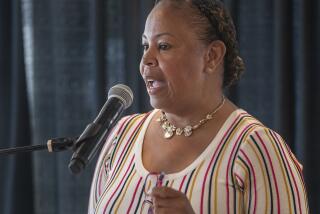An Old Tactic in a New Realm
- Share via
Throughout recent Los Angeles history, mayors have hidden behind the commissioners they appoint to oversee the huge departments that run the city.
Say, for example, the mayor wants a particular city agency to do something controversial. His commissioners get it done for him, while the mayor proclaims that the commissions act independently of him. And never should a system so free of politics be tampered with.
Mayor Richard Riordan says he wouldn’t have it any other way, too.
But actually it appears the mayor has transported this time-worn strategy into a new arena--the Metropolitan Transportation Authority, where a drive is under way to fire its embattled chief, Franklin E. White.
The field commander in the effort against White is Riordan’s strongest ally in the City Council, Richard Alatorre, who was appointed to the MTA board by Riordan. Like the mayor, Alatorre is a very powerful member of the board. Both men have been outspokenly critical of White.
Again like the mayor, Alatorre operates behind the scenes, and he has a couple political pals on the MTA board: John Fasana and Raul Perez. At Wednesday’s board meeting, they will ask to have White fired from his $175,000-a-year job, blaming him for construction fiascoes on the $5.8-billion subway project and for various management failures.
Fasana and Perez serve on the 13-member board as representatives of small Los Angeles County cities. Fasana is a Duarte councilman and Perez is on the Huntington Park council.
Board sources said that before the two pressed ahead with their ouster plan, they talked to Alatorre, who wants White fired.
While Riordan has not gone that far publicly, he has clashed openly with White and criticized his management of the agency. Less than two months ago, for example, Riordan and White got into a loud and public argument at an MTA meeting. Witnesses said Riordan had asked White for information. White replied that it was in the mayor’s briefing book, an answer that angered the mayor.
Riordan also exploded at a board meeting over the MTA’s public relations effort, savagely ridiculing the staff member responsible for it. The mayor assigned his own communications chief, Steve Sugarman, to rewrite the plan.
Despite all this, the mayor insists he has nothing to do with the Fasana-Perez ouster maneuver. “The mayor was not familiar with the recent action,” Deputy Mayor Rae James, Riordan’s transit expert, told me Monday.
Still, the events transpiring at the MTA have a familiar ring.
Riordan’s appointee as chairman of the Ethics Commission, Raquelle de la Rocha, led the effort to fire the commission executive officer, Benjamin Bycel. Riordan’s Police Commission has continually and aggressively criticized Police Chief Willie L. Williams in what appears to be an attempt to force him to quit or to ensure that he is not reappointed to a second term.
*
For years, Los Angeles mayors have wielded great but unseen power through such appointees.
Riordan, like his predecessors, appoints almost 250 members of city commissions and city representatives on powerful regional agencies, such as the MTA and the Metropolitan Water District.
The city commissioners set policy for such important departments as police, fire, the harbor, the airport and others. The system was conceived decades ago by reformers who thought that “citizen commissioners” would be free from politics.
It didn’t work out that way. The appointees have become part of the mayoral political operation, raising money and helping deliver important constituencies at election time. And they have consistently reflected the mayor’s policy views.
For example, early in Mayor Tom Bradley’s Administration, he appointed a liberal Police Commission determined to bring the independent-minded Police Department under civilian control. But later, when Bradley prepared to run for governor in an increasingly law-and-order state, he replaced the liberals with pro-police conservatives.
USC professor H. Eric Schockman said the situation hasn’t changed under Riordan.
“He holds a lot of power and the commissioners seem to be marching to the same drumbeat,” said Schockman, whose forthcoming book, “Rethinking Los Angeles,” will include a chapter on the commissions.
Schockman isn’t surprised that Riordan denies involvement with the dump-White movement. That’s always the way it is, he said.
“It’s bunk,” he said. “The mayor has everything to do with it. The mayor is CEO and commander in chief of the city.”
The commander in chief will be under a lot of pressure when the MTA board meets Wednesday.
Reporters and others will be measuring his words and facial expressions for clues. But Riordan, who likes to play poker, will try to keep the same straight face he has at the card table.
“He will hear what is said,” said Deputy Mayor James. “He will ask if this action is warranted and he will make his own judgments.”
If White goes, it will be another victory in the Riordan revolution. But the mayor apparently doesn’t want any of the credit--or the blame.
More to Read
Sign up for Essential California
The most important California stories and recommendations in your inbox every morning.
You may occasionally receive promotional content from the Los Angeles Times.













